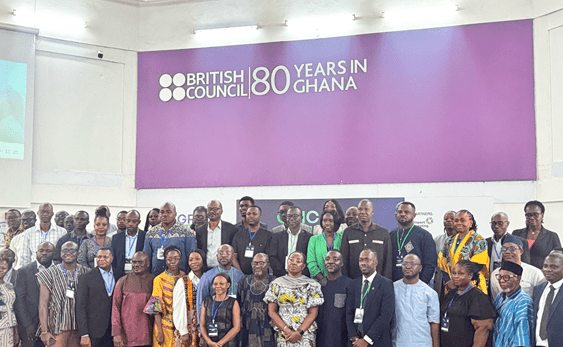Impact investors are intensifying efforts to transform Ghana’s academic research into commercially viable products, addressing a persistent innovation bottleneck that has limited the country’s technology-driven economic growth.
The 2025 Ghana Research Industry Collaborative Forum convened over 150 stakeholders from academia, industry, government, and international development at the British Council in Accra under the theme “Catalyzing Innovation through Partnership: Transforming Research into Scalable Solutions for Industry and Society.”
Ama Lartey, CEO of Impact Investing Ghana and GRIC Steering Committee Member, highlighted the challenge of research remaining unused. She indicated that the platform has reformatted more than 100 research projects into industry-friendly language, with about twelve presented to over 600 businesses and six moving toward commercialization.
The forum, now in its third year, represents a systematic approach to bridging the research-industry gap. GRIC, established in 2021, connects academia, industry, government, and development partners to transform research into real-world solutions through dialogue, knowledge exchange, and capacity-building initiatives.
Impact Investing Ghana has created a platform that simplifies research outputs for business audiences by removing technical jargon and highlighting potential financial returns. This translation process addresses a critical barrier where valuable research fails to reach commercial application due to communication gaps.
Early commercialization successes concentrate in agriculture and agribusiness, reflecting Ghana’s economic structure. Projects include artificial intelligence tools improving cocoa sector traceability and research extending food shelf-life, demonstrating how academic innovation can address practical industry challenges.
Reverend Dr. Cephas Adjei Mensah, Director of Research, Statistics and Information Management at the Ministry of Environment, Science and Technology, emphasized research’s role in economic transformation. He noted that policy alignment remains crucial to avoid fragmented initiatives while pushing for closer research institution-industry collaboration.
Funding challenges continue limiting commercialization efforts, with most support coming from grants rather than private capital for early-stage research. Lartey identified the newly-launched National Research Fund, proposed Startup bill, and trade policy initiatives as potential solutions for expanding financing opportunities.
The forum’s evolution demonstrates incremental progress over three years. The first year focused on identifying challenges, the second introduced industry briefings, and the third showcased concrete commercialization cases, reflecting systematic approach to addressing research translation barriers.
The GRIC secretariat is hosted by Impact Investing Ghana with objectives to become self-sustaining and independently hosted by key stakeholders. An 11-member steering committee and three sub-committees drive action focused on collaboration, capacity-building, and fundraising initiatives.
Ghana’s research commercialization challenge mirrors broader African innovation ecosystem issues where substantial academic output fails to translate into economic value. The GRIC model provides a framework that other countries could adapt for addressing similar research-industry disconnections.
Lartey expressed ambitious scaling goals, targeting growth from six commercialized projects to 20, then 100 and beyond. This expansion would require sustained coordination between universities, businesses, government agencies, and international development partners committed to innovation-led economic transformation.
The initiative aligns with Ghana’s broader economic diversification efforts beyond traditional sectors like cocoa and gold mining. Success in research commercialization could establish technology and innovation as significant drivers of economic growth and employment creation.
Private sector engagement remains critical for sustainable progress. Beyond grants and government support, attracting venture capital and impact investment funds will determine whether promising research projects can scale into significant commercial enterprises serving both local and regional markets.
As Ghana positions itself as a regional innovation hub, the GRIC forum’s outcomes will influence broader continental discussions about research translation, technology transfer, and university-industry collaboration essential for Africa’s sustainable development goals.
Source: newsghana.com.gh











